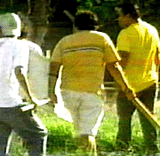
Popular Theater takes on La Quesera Massacre in El Salvador
We rode through the rural communities of the Bajo Lempa in a white pickup, picking up the survivors one by one. Maria. Elsa. Irma. Luisa. Lencho. Chici. All clamored into the back of the truck, chatting about this and that, their laughter filling the sweltering air around us. We were going to listen to stories that no one should ever have to tell: testimonies from survivors of the massacre of La Quesera, a brutal attack by the Salvadoran Army which took the lives 600-800 innocent people, mostly women, children and elders.





